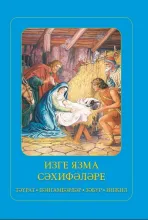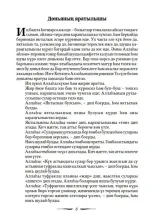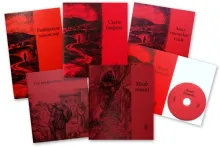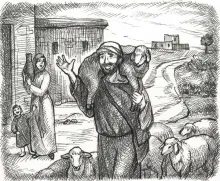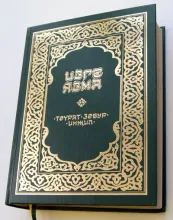Tatar
news-07022024
IBT has released the second edition of the Children's Bible in Tatar. This new edition has been carefully aligned with the text of the complete Bible in Tatar, published in 2015. The first edition of the Children's Bible has already become a rare find and over the past 12 years a new generation of young readers has emerged.
The Children's Bible is a collection of 250 Bible stories that recount the events described in the Old and New Testament, from the creation of the world to Revelation. This book contains retellings and direct quotations of selected biblical texts, ensuring a comprehensive understanding of these important events. To further engage young readers, each story is accompanied by a bright colour illustration that bring the stories to life...
newsletter-240219
The Institute for Bible Translation is pleased to announce a new edition of The Bible and the Koran: Parallel Passages, a scholarly work that presents the reader with passages from the Jewish and Christian Scriptures that find their parallels in the Koran, the sacred text of Islam. Whereas IBT’s earlier editions of this book came out in Russian (in 2005, 2012, 2014 and 2018), this time the book has been published in the Tatar language.
news-301117
IBT has published an edition of selected parables of Jesus from Luke’s Gospel in three more languages: Tatar, Rutul and Tsakhur. Previous editions of this book were published in Agul (2007), Dungan, Kumyk and Nogai (2016), and Dargi (2017).
newsletter-0616
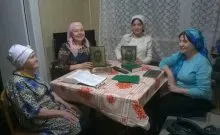
new-pub-260316
IBT has published the first-ever full translation of the Bible in the Tatar language. This is the fifth translation of a complete Bible into a non-Slavic language of Russia, following upon Chuvash, Tuvan, Chechen and Udmurt. Worldwide, the entire Bible has been translated into about 565 languages, now including Tatar. IBT’s Bible translation work into Tatar lasted more than 23 years. The work was carried out by specialists in linguistics, biblical studies, and the Tatar language from IBT, SIL and UBS, in cooperation with the Academy of Sciences of Tatarstan, and was printed with a stamp of approval from the Institute of Linguistics at the Russian Academy of Sciences.
newsletter-0915

newsletter-0412

news-01.02.00
A large number from the Tatar diaspora were assembled at the House of Nationalities in Moscow for the public release of the first New Testament in the Tatar language. Earlier a similar presentation had successfully taken place in the Tatar capital, Kazan, and now we wanted to repeat the event for the Tatars living in Moscow. However, this time several ardent Muslims were in the audience and started to violently question the new book. The atmosphere became tense and hostile, and finally one person said in a loud voice: “It would be my duty to do away with any Tatar who abandoned the Muslim faith!” How would we find a way out of this difficult situation?...

